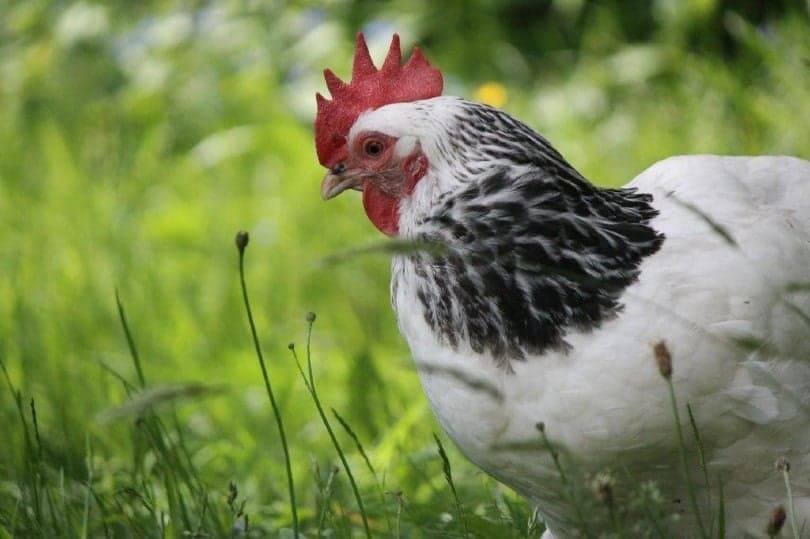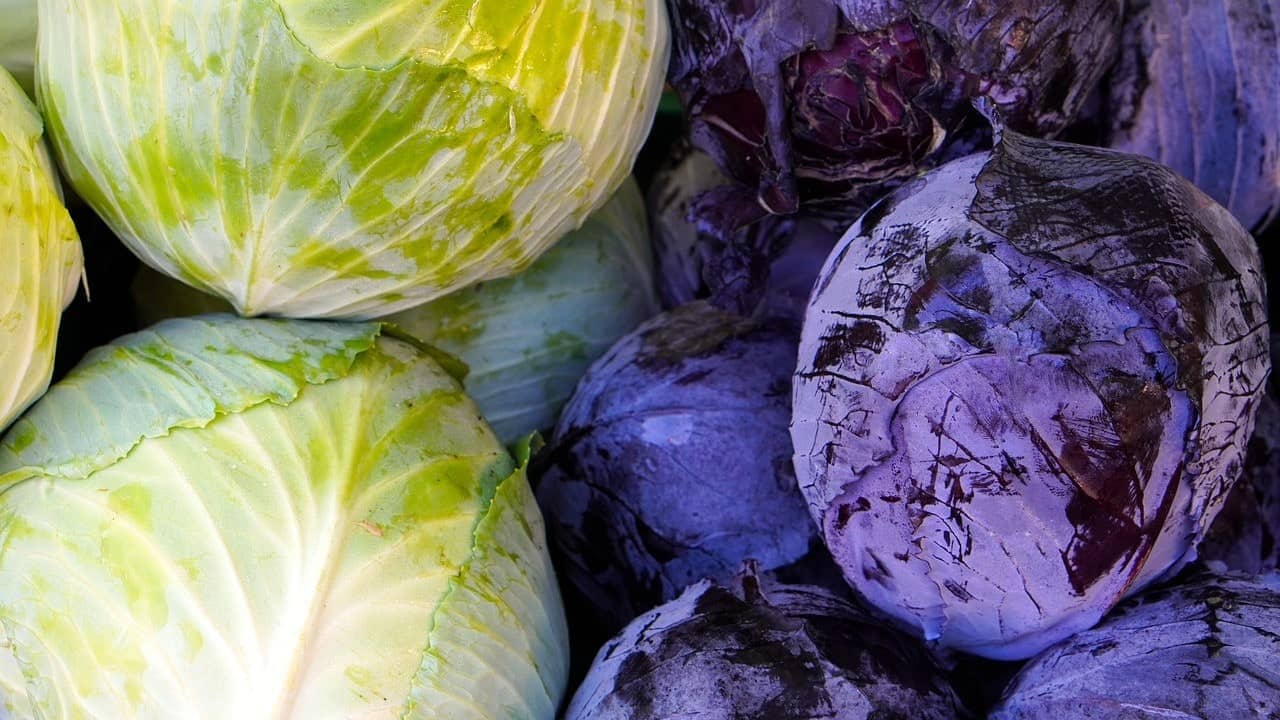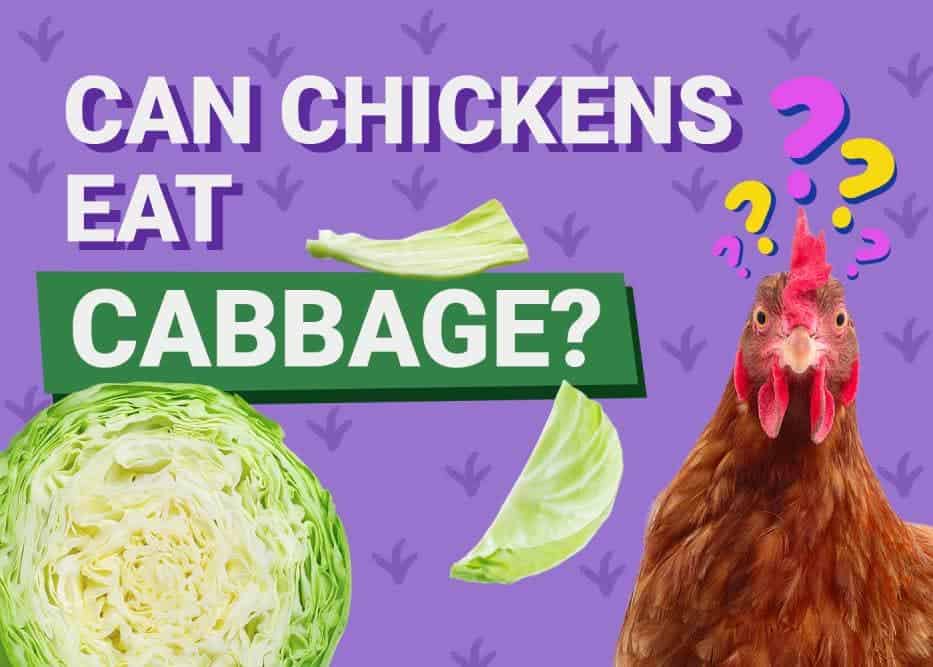Chickens typically eat a varied diet based on the food available for grazing. This can include different types of grasses, weeds, seeds, slugs, worms, and insects. They also need grit, as in dirt or sand, which helps them grind their food because they don’t have teeth. I
If you raise chickens, you may be wondering if you can feed your household scraps to your chickens. You can, and in fact, feeding scraps to your chickens has advantages for both you and your birds: The chickens get a varied, well-rounded diet, and you have the opportunity to cut down on household waste. That said, you have to be selective about which scraps you drop into their feeding tray.
So, what about cabbage? Since they are omnivores, chickens can eat a variety of fruits and vegetables, and cabbage is a nutritious treat that can complement your chickens’ diet. In this article, we explore the types of cabbage that your chicken can eat, how often they should eat cabbage, and the fruits and vegetables that you should avoid giving to your chickens.

What Types of Cabbage Can Chickens Eat?

If you buy cabbage for your family, you are probably already aware that cabbage is packed with nutrients. Cabbage contains vitamin C, folate, magnesium, potassium, vitamin A, vitamin K, and other nutrients. Like humans, chickens need a variety of nutrients to stay healthy. In order to preserve these nutrients, it’s best to feed your chickens raw or steamed cabbage. Avoid giving your chickens cabbage that has been prepared with ingredients that contain added sugar, fat, or salt, such as coleslaw.
Chickens can eat various types of cabbage, and all are nutritious. If you want to maximize the nutritional benefit, however, give red cabbage to your chickens. It’s a particularly wonderful source of vitamin C, as it contains about 30% more than its green cousin. Unlike humans, healthy chickens are capable of making their own vitamin C, but supplementing chickens’ diets with vitamin C can still be helpful when they are under stressful conditions, including heat stress. A supplement of vitamin C can also contribute to a healthy immune system in chickens.
What Parts of the Cabbage Can Chickens Eat?
Your chickens can eat the whole cabbage. One great way to feed your chickens this healthy snack and exercise them at the same time is to make a hanging cabbage. All you have to do is drill a hole through the center of the cabbage and thread a rope through the hole. Then, hang the cabbage in your chicken run, and watch your chickens go wild over it. Not only will they love the treat, but the exercise will also prevent them from getting bored. This is great because boredom can lead chickens to peck each other or even pull out each other’s (and their own) feathers.
How Often Should I Feed Cabbage to Chickens?

Like with all treats, chickens should be given cabbage in moderation. Too much could prevent your chickens from getting all the nutrients that they need. Too many treats could also lead to obesity, which comes with health complications and could shorten your chickens’ life expectancy. As a rule, a chicken’s diet should be comprised of about 90% complete chicken feed and 10% treats. That means they can have cabbage and other scraps a few times a week, but they should not have them every day and definitely not for every meal.
Chickens that eat cabbage and similar foods too often may also develop thyroid problems. Cabbage—along with soybeans, rapeseed, flax, broccoli, and turnips—contains goitrogenic agents, which can cause avian goiters, reproductive issues, immune deficiency, and other problems in some birds. But if your chickens eat cabbage in moderation, you should not be concerned.

What Fruits and Vegetables Should Chickens Not Eat?
Now that you know that chickens can eat vegetables like cabbage to supplement a well-balanced diet, you may be wondering which foods to avoid. Here is a list of plants that you should add to your compost pile instead of your chickens’ diet:
- Avocado skins and pits: Chickens can eat most fruits and vegetables, but you should avoid giving them any avocado skins or pits. These parts of the avocado contain persin, which is toxic to chickens and other poultry. Chickens can technically eat avocado flesh, but if you want to be safe, avoid avocados altogether.
- Tomato, pepper, and eggplant leaves: Tomatoes, peppers, and eggplants are members of the nightshade family, and their leaves contain an alkaloid known as solanine. If your chickens ingest these leaves, they will get very sick. However, the fruits themselves are harmless to chickens.
- Sprouting or green potatoes: White potatoes are part of the nightshade family, and when their skin is green, it is an indication that there is solanine present. Chickens can eat white potatoes that haven’t turned green, but they don’t contain much nutritional value for your birds. Swap white potatoes with sweet potatoes for a more nutritious and safer alternative.


Final Thoughts
You can indeed feed cabbage to chickens. In fact, a varied diet is important for the health of your chickens and the quality of their eggs. As long as you don’t overdo it, cabbage can be a nutritious snack with plenty of benefits for your chickens.
Read also:
